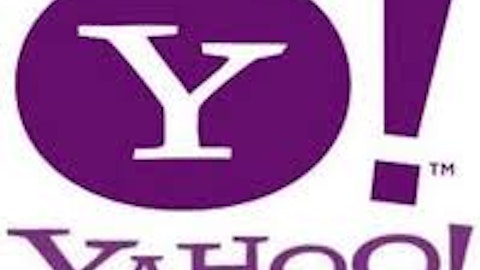Most tech savvy computer, smartphone, and tablet users rely heavily on all aspects of the web – search, portals, web-based emailing and messaging. How can investors take advantage of this hot area of the technology sector? There are many stocks competing for users in web search, web portals, and web-based mail and messaging. Is Yahoo! Inc. (NASDAQ:YHOO), Facebook Inc (NASDAQ:FB), Google Inc (NASDAQ:GOOG), LinkedIn Corp (NYSE:LNKD), Yelp Inc (NYSE:YELP) or even Microsoft Corporation (NASDAQ:MSFT) attractively priced? Which, if any represent a compelling investment?

Marissa Mayer, the Chief Executive Officer of Yahoo!, said that the company plans to increase advertising impressions on more than a dozen of its top sites. The agreement would allow the company to increase its revenue from these pages. Managing Director at RBC Capital Markets Mark Mahaney said, “I assume they wouldn’t be doing this is if they didn’t think they can better monetize their traffic. There should be a near-term positive.” He rated the company’s shares at outperform. The company also said that by adding Google to its list of contextual ads partners it can match its customers with ads that are more meaningful.
According to EMarketer estimates, Google would continue to maintain its top position in the $17.7 billion U.S. market for displaying ads, with 18% market share, while Facebook Inc (NASDAQ:FB) captures 15% share, and Yahoo!’s market share has declined to 8%.
Ms. Mayer also said that she plans to work with large companies such as Apple Inc. (NASDAQ:AAPL) and Facebook. She said, “We are able to work with some of these players, who have a lot of strength, to really bolster our user experiences that we offer on the Yahoo! site.”
Mayer plans to consolidate the company’s offerings to a dozen core categories. They include mail, search, weather and other “daily habits.” According to Mayer, the content is important, but her main aim is to increase user’s attraction to the content. She said, “Our biggest business problem is impressions, can we get growth happening there. The way in a consumer business to grow revenue is grow usage or prices. We’re growing prices, we need to grow usage.” She believes that impressions come with traffic and it is the company’s content that is going to increase traffic.
Microsoft will operate a U.S. advertising campaign influencing clients to drop Google’s Gmail for its own online email services, increasing its rivalry for internet users. Television, print and online spots will commence featuring of the word “Scroogled!” in the colors of logo of Google, criticizing the operator for scanning the text of email messages to tailor ads to users. In July 2012, Microsoft unveiled Outlook.com to slowly replace its free online email service Hotmail. According to ComScore’s November data, Hotmail has less than half as many users as compared to other online email services Gmail and Yahoo!. Microsoft’s Bing, a search engine that competes with Google, is also trying to increase its customer base in the U.S. by winning over Google users.
According to Chris Gaither, a spokesman for Google, “Advertising keeps Google and many of the websites and services Google offers free of charge. We work hard to make sure that ads are safe, unobtrusive and relevant.”
Facebook unveiled a tool to search information available on its social network of over 1 billion users, by creating a substitute to services already provided by Google, LinkedIn Corp (NYSE:LNKD), and Yelp. According to Mark Zuckerberg, the Chief Executive Officer of the company, graph search allow users to discover photos, people, interests and places. The company has described how the service could be used by recruiters to discover possible hires and by members seeking dating partners. Once the service is fully developed and launched, it will offer users with an incentive to spend less time on other platforms. According to Susan Etlinger, an analyst at Altimeter Group, there is a lot of pressure on Facebook to increase and expand its monetization efforts.
Zuckerberg said that he would “love to work with Google,” but could not succeed in entering into an agreement with Google in collecting and using people’s data. The tool would help the users of Facebook in finding out information more efficiently; the results would be based on data already accessible to users based on their preferences. Meanwhile Danny Sullivan, founder of the Search Engine Land technology blog, said that Google is moving to Facebook’s turf with its own social-networking service, Google+, which was unveiled in 2011.
Though these companies are maneuvering to stay ahead of each other, their valuations are often quite high:
| Ticker | Company | P/E | P/S | P/FCF | EPS Growth Next 5 Years |
| MSFT | Microsoft | 15.39 | 3.22 | 11.36 | 8.4% |
| YHOO | Yahoo | 6.39 | 4.98 | NA | 13.9% |
| GOOG | 24.42 | 5.21 | 19.59 | 14.3% | |
| YELP | Yelp | NA | 10.1 | NA | 18.5% |
| FB | 2832 | 13.26 | 178.94 | 29.2% | |
| LNKD | 856.11 | 17.98 | NA | 61.3% |
Facebook, LinkedIn, and Yelp trade at incredibly high price-to-sales ratios and are unattractive on this basis alone. Further down the price-to-sales spectrum, Google has a high price-to-earnings ratio. Yahoo! temporarily has a low price-to-earnings ratio, but its forward P/E is forecast to be 17.5. This makes it less attractive than Microsoft on the basis of valuation. However, Microsoft is not that cheap, especially when compared to the average 14 P/E ratio of the S&P 500.
The market leader in search and web use, Google, is too expensive to warrant consideration. Yelp, Facebook, and LinkedIn are even more expensive. Neither Yahoo! nor Microsoft are trading at valuations that are cheap enough to warrant betting on either company competing in a contentious industry.
The article Can These Web Intensive Stocks Help You Get Rich? originally appeared on Fool.com and is written by Bill Edson.
Copyright © 1995 – 2013 The Motley Fool, LLC. All rights reserved. The Motley Fool has a disclosure policy.




